The topic of childhood vaccinations has been hotly debated for many years, but the consensus has not yet come to the consensus that the baby should be vaccinated or not. The main argument of those who are “against” are possible complications and side effects. However, not every reaction is a complication, because of which it is necessary to refuse vaccinations. For example, an increase in temperature in almost all cases is a normal course of events. So that parents do not have a reason to panic, we’ll try to figure out what vaccinations and why they cause a child’s fever, how to prepare for vaccination and how to recognize the warning signs of complications.
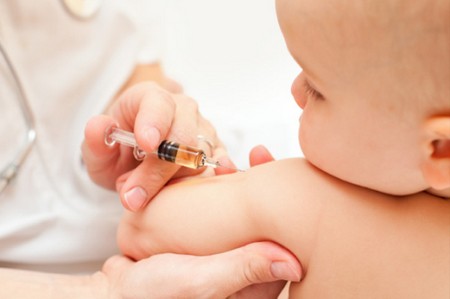
The temperature after vaccination is normal
Vaccinations are set for the sole purpose - to form immunity to pathogens. The condition of the child after vaccination can be called a disease in a very, very mild form. However, the baby’s immune system activates and fights the pathogen during such a “disease”. Accompanying this process with temperature is a completely normal phenomenon.
- Elevated temperature indicates that the body is immune to the introduced antigen (“the body is fighting”). In this case, special substances that form during the formation of immunity enter the bloodstream. They lead to an increase in temperature. However, this reaction is very individual. For some people, the “struggle” of the body goes away without a fever.
- The possibility of increasing the temperature depends not only on the characteristics of the body, but also on the vaccine itself: on the degree of its purification and on the quality of antigens.
How to prepare for vaccination
Every young mother knows about the existence of a vaccination calendar. The schedule of vaccinations is sometimes changed, but the mandatory vaccinations in it remain unchanged: vaccination against pertussis, diphtheria and tetanus, tuberculosis, hepatitis, mumps, polio and rubella. Some vaccinations are given once, some in several “stages”.
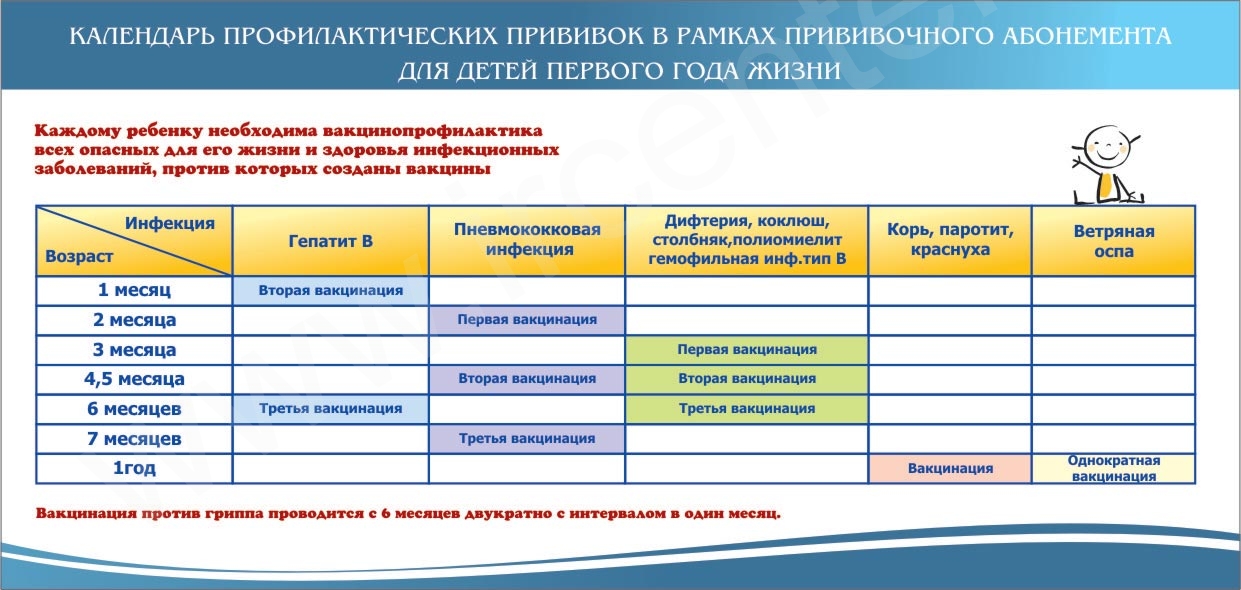
Attention! If parents do not want to be vaccinated, they can write a refusal. This decision is better to think carefully over and weigh all arguments. Without vaccinations, a child may have difficulty going to kindergarten and school, and even traveling on vacations to a children's camp or abroad.
If the vaccine is to be - it is necessary to prepare the baby for it. This will help smooth out the vaccine response.
- In the next 2-4 weeks before vaccination, the child should not be sick. On the day of vaccination, he must also be completely healthy. Moreover, "completely" - this is really completely.Even a runny nose or a slightly hoarse voice is a reason to postpone the vaccination;
- During the week before vaccination, do not experiment with complementary foods and new products. After vaccination, it is also better to maintain a week on the usual diet;
- If the baby has chronic diseases - before vaccination, it is necessary to take tests to check the condition of the body;
- If the child has an allergy - a couple of days before vaccination, you can start giving an antihistamine (for example, Fenistil drops) and continue to give it a few more days after;
- Vaccination is given only after examination by a pediatrician. The pediatrician must make sure that the child has a normal temperature (36.6 degrees) and there are no visible signs of the disease, as well as ask the mother about the condition of the baby in recent days. Unfortunately, such examinations are often carried out very formally. And yet, the mother is responsible for the health of the child, not the doctor, so if the mother did not satisfy the examination, then do not be shy to ask the doctor to measure the temperature and examine the child properly.
We read on the topic:
What is the normal body temperature for a baby (36 - 37.3 ° C - in the armpit; 36.6 - 37.2 ° C - oral temperature; 36.9 - 38 ° C - rectal temperature);
- Often, parents are worried to find that their baby is at a temperature of 37 degrees or even higher. An elevated temperature is perceived as a sign of a disease, it seems that the baby requires mandatory and immediate treatment -37 ºC - normal or not
- How to measure the temperature of a newborn baby. Where is better to measure (in the armpit, rectally in the rectum, in the ear) and with which thermometer?
When to vaccinate categorically is impossible
Some factors are a categorical contraindication for vaccination. So, you can not be vaccinated if:
 the child weighs less than 2 kg (this applies only to BCG vaccination);
the child weighs less than 2 kg (this applies only to BCG vaccination);- previous vaccination ended with complications;
- the baby has malignant oncological diseases;
- the child suffers from congenital or acquired immunodeficiency;
- The child has severe allergies for chicken protein, baker's yeast (contraindication for hepatitis B vaccination) and antibiotics of the aminoglycoside group;
- the baby is prone to convulsions and has diseases of the nervous system (contraindication for DTP vaccination);
- an exacerbation of a chronic disease occurs or the baby picked up the infection, and it is still in the acute phase (the vaccine is not canceled, but is temporarily delayed);
- the child has recently returned from a long trip and has not yet adapted to the previous climate;
- the child has epilepsy and has recently had an attack (vaccination is delayed for 1 month).
Temperature after vaccination: when to worry
It is impossible to predict the reaction to the vaccine in advance: it depends on the vaccine and on the state of the body. However, it is possible to understand whether the reaction is natural or whether it is time to sound the alarm. Each vaccine has its own picture of a normal reaction and complications.
- Hepatitis B vaccine
A hepatitis B vaccine is given in the hospital immediately after birth. A small seal usually appears at the injection site, after vaccination the temperature rises, sometimes weakness occurs. With a normal reaction to the vaccine, the temperature increase lasts no more than 2 days. If it lasts longer or any other symptoms appear - you need to urgently seek advice.
- BCG vaccine
BCG is a tuberculosis vaccine. The vaccine is also given in the hospital for 4-5 days of life. First, a red seal appears at the vaccine injection site, which in a month turns into an infiltrate of approximately 8 mm in diameter. Over time, the wound becomes covered with a crust, and then completely heals, and a scar remains in its place. If healing does not occur by 5 months and the place of vaccination is festering, while the temperature rises - you need to go to the hospital. Another complication of BCG is the formation of a keloid scar, but this problem can be felt only a year after vaccination.In this case, instead of the usual scar, an unstable red scar forms on the vaccination site, which hurts and grows.
- Polio vaccine
This vaccine is not a traditional injection, but drops that drip into the baby's mouth. Usually it does not give any reaction and is tolerated very easily. Sometimes, 2 weeks after vaccination, the temperature may rise, but not higher than 37.5. Also, not always in the first couple of days after vaccination, there is an increase in stool. If other symptoms of malaise appear after vaccination, you need to seek medical help.
- Vaccination against whooping cough, diphtheria and tetanus
Such a vaccine is given by a combined vaccine of Russian (DTP) or imported (Infanrix, Pentaxim) production. The fact of "combination" already suggests that vaccination will be a serious burden on the immune system. It is believed that the domestic vaccine is worse tolerated and more likely to cause complications. In any case, after this vaccination, a temperature increase of up to 5 days is normal. The vaccination site usually turns red, there is a seal, which may bother the baby with its soreness. With a normal reaction, after a month, the lump dissolves.
If the temperature rises above 38 and does not get off by conventional means, it is better to call an ambulance, especially if the child is prone to allergies (in allergy sufferers, the vaccine can provoke anaphylactic shock). Another reason for seeking medical help is diarrhea, nausea and vomiting after vaccination.
- Mumps vaccine
Usually vaccination passes without a visible reaction. In rare cases, from 4 to 12 days after vaccination, the parotid lymph nodes may increase, the stomach aches, a slight runny nose or cough appears, the larynx and nasopharynx swell slightly, the temperature may rise and a seal may appear at the injection site. The general condition of the baby remains normal. If a fever rises or an indigestion is observed, you need to see a doctor.
- Measles vaccine
It is set per year and also usually does not give a reaction. Sometimes, 2 weeks after vaccination, the temperature rises, a slight runny nose and a rash on the skin appear, resembling measles symptoms. In a few days, all the consequences of the vaccine go away. High temperature, not falling after 2-3 days, and poor general well-being of the child are a reason for consultation with a doctor.
Here about all vaccinations: vaccination calendar for children up to a year
We also read detailed articles:
How to watch a child after vaccination
After the child has been vaccinated, you need to monitor his condition. This will help you notice complications and take action in time..
- The first half hour after vaccination
Do not rush home. In the first 30 minutes after vaccination, the most serious complications, such as anaphylactic shock, usually make themselves felt. It is better not to be far from the vaccination room and watch the baby. The cause for concern will be the pallor of the skin or its redness, the appearance of shortness of breath and cold sweat.
- The first day after vaccination
During this period, most often there is an increase in temperature as a reaction to vaccination (especially after vaccination with DTP). You can not wait for the temperature to rise and immediately after vaccination give the child an antipyretic (for example, put a candle with paracetamol or ibuprofen). As the temperature rises, it needs to be reduced. If the temperature does not drop, be sure to call an ambulance. Even if the vaccine is “easy” and the baby has no reaction, it is not recommended to walk and have a bath in the bath on the first day.
We also read: Is it possible to bathe a child after vaccination
- The second or third day after vaccination
Inactivated (i.e., non-living) vaccines can cause allergies, so you can give your child an antihistamine to prevent it.
Such vaccines include polio, hemophilia, pertussis, diphtheria and tetanus vaccines, as well as hepatitis.As for high temperature - the rules are the same: to bring down antipyretic and call a doctor if the thermometer is more than 38.5.
- Two weeks after vaccination
After such a period of time, the reaction can only appear on vaccinations against rubella, measles, polio and mumps. The temperature does not rise much, so it should not cause much concern. If the child was vaccinated not from the named list, and after 2 weeks the temperature has risen, it is not necessary to link the temperature and the vaccine: this is either a beginning illness or a reaction to teething.
How to relieve the condition of the baby after vaccination
Such unpleasant phenomena for a child as fever and pain at the injection site are not well tolerated by babies. It is necessary to alleviate the condition of the baby and try to remove the symptoms of the reaction to the vaccine.
- When a child is sick, they are not advised to lower the temperature to 38 degrees (see links above) This rule does not apply to temperature after vaccination. If the child does not tolerate the temperature to 38 degrees, it can be reduced. It is best to use candles with paracetamol or ibuprofen. It is difficult to bring down a temperature above 38 with one candle, therefore it is better to combine candles with syrup, and it is desirable that the candle and syrup contain different active substances (for example, a candle with paracetamol (Panadol), syrup with ibuprofen (Nurofen)). At temperatures above 38.5, we call an ambulance. Using antipyretics, do not forget to read the instructions so as not to exceed the permissible norm. Important!List of temperature medicines allowed for children under one year old;
- Do not ignore the physical methods of cooling at high temperatures: a minimum of clothing, wiping with a damp cloth;
- To alleviate the condition of the child, it is worth taking care of the microclimate at home: we ventilate the room, humidify the air;
- Usually, with a malaise, the child does not have appetite, so you should not insist on food. On the contrary, you need to drink more to compensate for the loss of fluid. Offer your baby to drink at least a sip, but often;
- To relieve inflammation at the injection site, you can make a lotion with novocaine and lubricate the seal with Troxevasin ointment.
It is very dangerous to choose the wrong tactics of behavior during high temperatures. Here is what you absolutely do not need to do:
- give the child aspirin (it has many side effects and can cause complications);
- wipe the body with alcohol or vodka (alcohol is not compatible with drugs, but through the skin it is absorbed, although in small doses);
- to go for a walk and bathe the child in a warm bath (a walk is an extra burden on the body, and bathing in warm water will only increase the temperature);
- make the child eat (all the forces of the body are devoted to the formation of immunity and restoration of normal state, the need to digest food will “distract” the body from a more important task).
We also read:
Carefully monitor the condition of the baby, keep your finger on the pulse and do not hesitate to ask questions to doctors or seek help. If you prepare for vaccinations and keep everything under control - they will turn out to be not at all scary.
Komarovsky: Actions after vaccinations

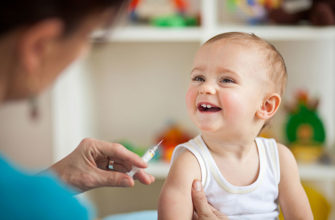
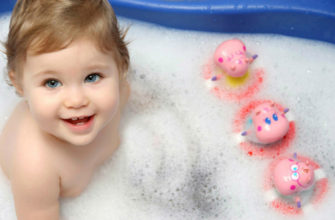
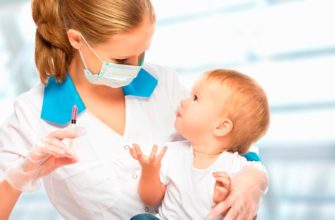
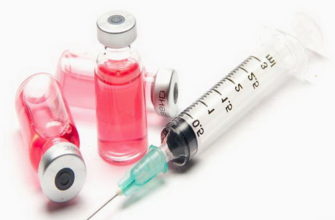
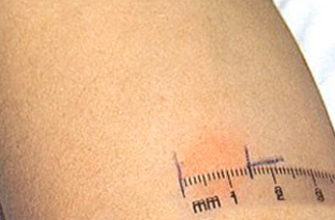
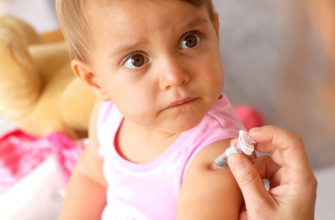

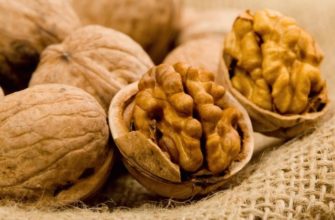
I was given all the vaccinations and my peers did. I see no reason not to do them. All conversations are reduced only to the fact that "it is impossible because it is impossible." there may be complications. If the child is sick, this is one thing, you need to read the recommendations (for example, in this article). But if he is healthy, why not vaccinate the child from terrible diseases?
There are so many negligent mothers now, I doubt that they are thoroughly interested in the health features of their baby. Hence, we have sad statistics on mortality from vaccinations.
Strongly against vaccinations!
Jelenia Ryabtseva writes: why not vaccinate a child from terrible diseases?
No vaccine protects 100%, and does not protect at all, the disease will happen anyway (if it happens at all). Vaccinations need to be repeated (updated) since they are not for life. The human immune system fights the disease and not the vaccine. Vaccination is unnecessary chemistry. Love your children. Do not stuff them with chemistry.
Alina completely agree with you !!! Vaccinations, on the contrary, destroy the immune system! By the way, I am from Baku and it’s completely different here, the table is different! So understand whether vaccinations help our children or ruin them!
The baby is deeply premature, they put on a bj at 1.9, a month later the temperature is high and an inflamed abscess, the blood counts have been increased, white blood cells are raised, is it worth it to be associated with the vaccine?
Elly, where do you get this nonsense from then ... Yes, and so many exclamation points. Take the trouble to read literature on the peculiarities of the development of the children's immune system, and the role of vaccinations in this development, and in general study at least the essence of what vaccination is, and only then write. Any introduction of a foreign substance into our body is a risk, even if it is a glucose solution, even serum, at least. And you need to approach this process responsibly and carefully, and not leave everything to the doctor.